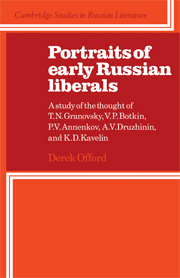 Portraits of Early Russian Liberals
Portraits of Early Russian Liberals The Russian liberals whose thought has been examined in this study shared many views and attitudes, although they did not constitute or belong to any political party or even any intellectual circle in the formal sense. They were all humanitarian men who – before the event at any rate – favoured the abolition of serfdom. They all cultivated enlightened values derived from the West, whose civilisation they admired and in which Granovsky, Botkin and Annenkov at least spent long periods. They cherished friendship and personal relationships and refused to look on individuals as mere ciphers in some sociological or political calculation. Like John Stuart Mill, and in opposition to the Slavophiles, they bemoaned the deadening effect of custom, posited in the human personality a need for self–development and individuality, and believed that there was a ‘need of persons’ – as Mill put it, more eloquently than they – who might not only ‘discover new truths, and point out when what were once truths are true no longer’ but also ‘commence new practices, and set the example of more enlightened conduct, and better taste and sense in human life’. They also demanded that the intellectual bring fairness and toleration to assessments of the society and culture of a given nation, including his own. Where there was contention they endeavoured to understand both points of view, to weigh the evidence more or less dispassionately and to come to rational and sober conclusions.
To save this book to your Kindle, first ensure [email protected] is added to your Approved Personal Document E-mail List under your Personal Document Settings on the Manage Your Content and Devices page of your Amazon account. Then enter the ‘name’ part of your Kindle email address below. Find out more about saving to your Kindle.
Note you can select to save to either the @free.kindle.com or @kindle.com variations. ‘@free.kindle.com’ emails are free but can only be saved to your device when it is connected to wi-fi. ‘@kindle.com’ emails can be delivered even when you are not connected to wi-fi, but note that service fees apply.
Find out more about the Kindle Personal Document Service.
To save content items to your account, please confirm that you agree to abide by our usage policies. If this is the first time you use this feature, you will be asked to authorise Cambridge Core to connect with your account. Find out more about saving content to Dropbox.
To save content items to your account, please confirm that you agree to abide by our usage policies. If this is the first time you use this feature, you will be asked to authorise Cambridge Core to connect with your account. Find out more about saving content to Google Drive.